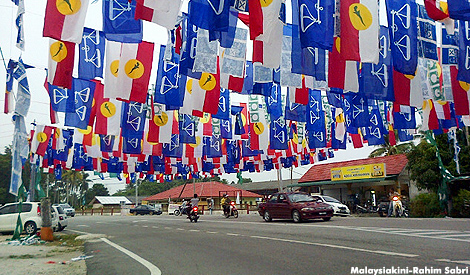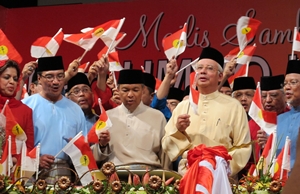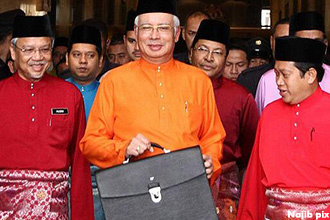
DR BRIDGET WELSH | 3:22PM Dec 31, 2013
Malaysiakini
COMMENT As 2013 draws to a close, it has not been a good year for democracy in South-East Asia. Recent news has riveted on the protests in Thailand, where those dissatisfied with the current leadership of Yingluck Shinawatra and her amnesty provisions have taken to the streets rather than opt for a solution through elections.
Throughout the year, however, there have been worrying signs that the increase of authoritarian practices, intolerance, failings in governance and discontent from the public at large have been on the rise in the region.
While the Philippines celebrated one of the fairest and non-violence legislative elections in its history in May, two of the countries in the region experienced among the worst elections in their history.

In both polls, protests dogged the results and even months later, large sections of the population continue to believe that the polls were illegitimate. In Cambodia, the opposition has boycotted parliament, and protests continue. The scope of the irregularities remain serious enough to question the legitimacy of both governments.
It is this very weakness and knowledge that these governments were not elected in free and fair polls that has led to further denials and resistance to reform the institutions regulating elections, the respective election commissions.
In the region, the electoral core of democracy is under threat, with this sowing the ground for extremism, anger and violence. Thailand clearly shows the impact of a loss of faith in the electoral process, which is taking root in other countries as well. The call for genuine electoral reform is more pressing than ever.
Governance deficits
The challenges for democracy are being compounded by governments that have failed to deliver on their promises. For decades, South-East Asia’s stability has rested in part on economic development, as infrastructure and incomes have improved. This process has both slowed and become more uneven since the 1997 Asian financial crisis, with widening inequalities and importantly narrowing opportunities for social mobility.
The dominant strategy has been the use of populist initiatives in cash handouts and subsidies. This practice has extended from Thailand to Indonesia in part because it is easy.
Not only has it placed strains on finances – with the Thai rice subsidy costing billions of dollars – it has failed to achieve its aim of bringing more people towards a sustainable quality livelihood. The impact of programmes, such as the expanded affirmative action programme – the Bumiputera Economic Empowerment Programme (BEEP) for bumiputeras in Malaysia – has been increased dependence.
This is akin to drug addicts, in which the government gives the beneficiaries a temporary fix rather than fundamentally addressing the core issues of poverty, social mobility and inequality.

As the disconnect between governance and economic empowerment of South-East Asians has evolved, there has been one consistency – corruption. Those at the top are taking from the people without remorse. The entitlement of elites in power is a rot inside the system that perpetuates inequality.
Scandals have riveted the Philippines where nearly 50 senior officials are now under arrest for syphoning funds to bogus NGOs from public development funds, namely the Congress Development Assistance Fund (PDAF). Elsewhere in the region, funds are mysteriously supporting government-linked NGOs without accountability and transparency.
There is a certain degree of numbness that has come from the steady battery of scandalous revelations, as more people across the region are disheartened with the failure of enforcement and legal bodies to impose the rule of law.
Authoritarian practices
This sense of dismay with governance has contributed to the rise of authoritarian nostalgia in the region, with people turning to the ‘good ol’ days’ of the past.
Attacking the ‘other’ has been a common authoritarian practice. Whether over sexuality, religion, race or political affiliation, there has been consistency in the targeting of minorities within countries.
Religious freedom has come centre stage, with many feeling that their right to practice their faith is under threat. This is happening in Malaysia, from Christians to the Shiites.
Similar challenges can be found across the region. Of particular concern is the hate speech by the anti-Muslim 969 movement in Myanmar, with striking parallels to the anti-Christians move in Malaysia who felt it appropriate to recently berate Christians around one of the most sacred holidays.
Governments have stood by and in some cases been involved in the targeting of minorities, especially in their government-linked presses. Intolerance has morphed into practices that lack decency and a basic appreciation of human dignity.
The targeting of minorities is a honed tool to distract attention from deficits in governance and channel the disappointment with policy failures. It sows anger and violence. Sadly, the year has been marked by a rise in violent incidents reflecting a lack of faith in government institutions and growing frustration. Be it the riot in Little India in Singapore or the bombing of the Buddhist temple in Jakarta in August. There are costs to pay for perpetuating indifference, fueling hatred and letting it continue to boil.
Moving forward
The trajectory of democracy is not a linear one. While 2013 may have been difficult for democracy, and it would appear with rising costs, unresolved political polarisation and simmering tensions, these trends are likely to continue, the new year brings the opportunity to learn and regroup.
We must have faith in one another and the shared humanity of all of us across different faiths. We must harness hope, especially among young people whose ingenuity and zeal offers us ideas and energy to address today’s challenges. Finally, we must not let despair overshadow our ability to develop innovative solutions to problem solve.
Amidst the dark clouds, there are those continuing to be pushing for light. The year has seen more ordinary people in Southeast Asia take power into their own hands to call for changes, either at the ballot box or on the streets.
Never underestimate the intelligence of ordinary people. Even in the most challenging environment, the silent majority in the region do not condone the practices of bigotry and violence.
Ironically, it is the very power of these demands for fairness and dignity that are provoking the more authoritarian responses. It is these underlying forces that offer the most promise for the year ahead.
____
DR BRIDGET WELSH is associate professor of political science at Singapore Management University. She can be reached at bwelsh@smu.edu.sg.